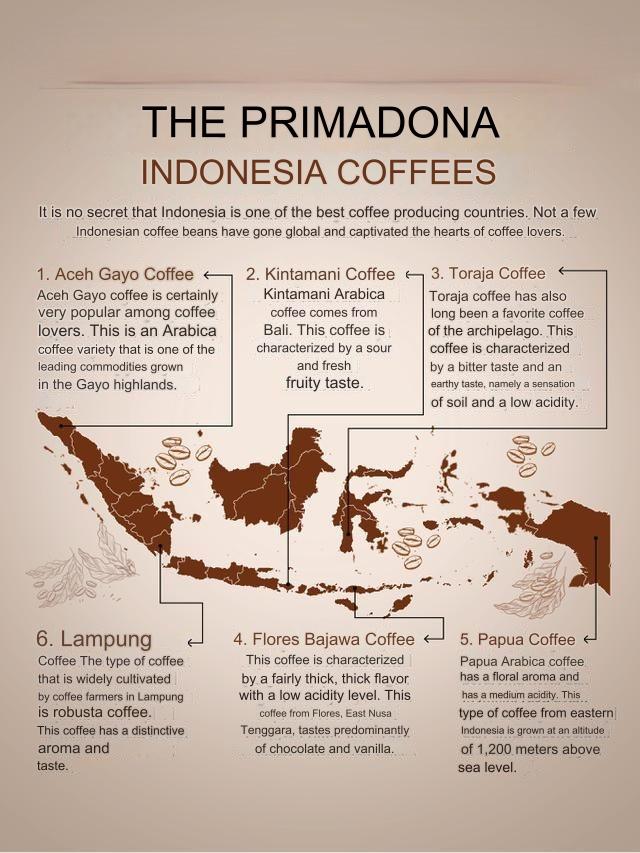
Indonesia is a true paradise for coffee lovers. Nestled between the Pacific and Indian Oceans, this archipelago is home to a rich tapestry of coffee varieties, each with its own unique flavors and characteristics. From the highlands of Sumatra to the volcanic slopes of Java, let’s delve into what makes Indonesian coffee so special.
1. The Geography of Flavor
Indonesia boasts a diverse range of microclimates and rich volcanic soil, which play a crucial role in shaping the flavor profiles of its coffee. The country’s many islands provide distinct conditions for coffee cultivation.
Sumatra: Known for its bold, earthy flavors and low acidity, Sumatran coffee often has herbal, spicy, and chocolate notes. The wet-hulling process, unique to the region, enhances these characteristics, resulting in a heavy-bodied cup.
Java: Coffees from Java tend to be smoother and more balanced, with bright acidity and hints of caramel and nuts. The island’s coffee has a cleaner taste, often with a lingering sweetness.
Sulawesi: This region offers coffee with complex flavors, often described as rich and full-bodied, featuring fruity notes and earthy undertones. Sulawesi coffee is less known but is a hidden gem for adventurous coffee drinkers.
2. Unique Processing Methods
Indonesian coffee is often processed using methods that influence its flavor:
Wet-Hulling (Giling Basah): Predominantly used in Sumatra, this technique involves removing the outer cherry and partially drying the beans before hulling. This method contributes to the coffee’s earthy flavors and heavier body.
Natural Processing: In regions like Sulawesi, natural processing is common, where beans are dried with the fruit still intact. This can impart fruity and floral notes, adding complexity to the cup.
3. Flavor Profiles to Savor
Indonesian coffee is celebrated for its unique flavor profiles, which can vary significantly by region:
Sumatra Mandheling: Known for its deep, syrupy body, it often features notes of chocolate, spice, and a hint of sweetness. It’s a favorite among those who appreciate robust flavors.
Java Arabica: Characterized by a milder taste, it usually has a clean finish with notes of nuts, cocoa, and a touch of citrus. This coffee is perfect for those who enjoy a well-balanced cup.
Toraja: Grown in the mountainous regions of Sulawesi, Toraja coffee is often described as complex, with a floral aroma, fruity acidity, and a rich, full body. It’s a fantastic choice for those looking to explore something different.
4. The Cultural Significance of Coffee in Indonesia
Coffee is not just a beverage in Indonesia; it’s a part of the culture and daily life. Many Indonesian communities have their own traditional ways of preparing coffee, often using local techniques and ingredients.
One popular method is the kopi tubruk, where ground coffee is boiled directly with water and sugar, creating a strong, aromatic brew. This method is often enjoyed during gatherings, reflecting the communal aspect of coffee drinking in Indonesian society.
5. Sustainable Practices and Future of Indonesian Coffee
As the demand for sustainable coffee grows, many Indonesian farmers are adopting eco-friendly practices. Initiatives focusing on organic farming, shade-grown coffee, and fair trade are gaining traction, ensuring that the rich flavors of Indonesian coffee can be enjoyed for generations to come.
Conclusion
Indonesian coffee is a journey of flavors, steeped in tradition and rich history. Whether you prefer the earthy depths of Sumatra, the smoothness of Java, or the complexity of Sulawesi, there’s an Indonesian coffee waiting to captivate your palate. So, the next time you sip a cup, take a moment to appreciate the unique story and flavor that each bean brings from its distant island home. Happy brewing!
Find Us : - Tiktok : nusa.aroma / nusajava - Instagram : nusa.aroma / nusa.java - Facebook : Nusa Aroma / Nusa Java